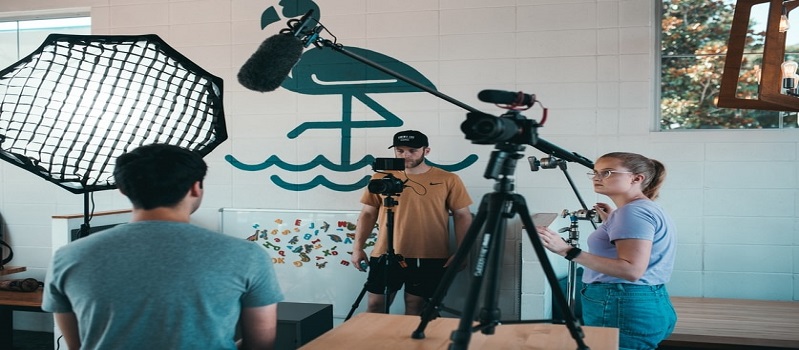Unleash the power of documentary filmmaking, not compromising your pockets this time.
That’s true. Going back to the nostalgic days with Bill and Ted and then seeing them again in 2020 (with Bill and Ted: Face the Music), we can make a bit of an observation.
No doubt, the bromance of Keanu Reeves and Alex Winter is the thing we enjoy n the movies and in the interviews. But it is the interviews where we would like to focus.
In an interview long ago, Alex Winter stated himself that he is even ready to leave the limelight of feature films or mainstream Hollywood blockbusters for the love of making documentaries.
And that is probably the thing all of us filmmakers believe. We know that the world is a place where you can make documentaries on almost an umpteenth number of themes. And to do that, we will go forward and make it happen. Even if budget is the problem, we won’t stop our enthusiasm to create an amazing masterpiece on celluloid in the form of a video that is both informative and artistic.
That sounded so dramatic, right?
Yes…a little.
However, those motivational words have got just slipped into a practical statement: Making a documentary on a budget.
You can do this.
If you read this post till the last!
-
How Making a Documentary Can Turn out to Be Affordable
So, you are about to engage yourself online for taking out a legit loan for bad credit from Ireland lenders now?
Okay, you will get to know a little about these loans too!
For now, you keep on reading the following points to make a cost-effective documentary film.
- Look for Money by Allowances and Campaigns
- A Cheap Camera or Your Phone Would Just Do Fine
- Trade Skills to Manage Crew
- Please Use Stock Music
- Archival Footage and Photos Will Help You
- Editing? You Can Do It Yourself
- Use Smart Tricks about Festivals & to Distribute the Film
- To Conclude: Work with Less People (No Offence!)
Without further ado, let us get to know about these points in detail.
1. Look for Money by Allowances and Campaigns
You can get in touch with organisations, particularly the non-profit ones, which might allow grants to you. With the help of these permissions, you get allowed to shoot a film in a variety of outdoor and indoor locations where you might not be charged high costs. Sometimes you can also get an opportunity to shoot in specific locations free.
Apart from that, starting a fundraising campaign is not always a bad idea. Maybe it will feel a bit different for you if you are a first-timer. However, do not hesitate. Doing this will also tell funders (and general people in particular) about the nature and quality of the project you are making for them. This will make them understand what value your project bears in their lives.
2. A Cheap Camera or Your Phone Would Just Do Fine
You don’t need a cinema camera to make a documentary. Yes, it doesn’t mean that those cameras are necessarily bad. Moviemakers use them. But to make a film on a budget, you don’t always need them.
You can make a documentary with a premium look and feel with the help of a simple DSLR or a mirrorless camera.
Want even cheaper rates? Well, you can definitely go shooting with your Smartphone and make a fantastic documentary film people won’t even know that you have shot them using your phone.
You can make this your USP in the industry.
While shooting on a ‘so called’ low-end camera, you need to take care of three things. They are:
A-frame rate per second (FPS) of 24, which means 24 FPS (or 25 FPS) because that gives you the cinematic look and feel. Do not go as high as 30 FPS.
Use an aspect ratio of 16:4.
And don’t forget to add the proper colour grading as per the theme of your documentary.
3. Trade Skills to Manage Crew
Many use this because this is one of the most strategic ways to save money as a filmmaker.
If you have been a tenant, chances are you offered some sort of service to your landlord to get reduced rentals.
The same idea works here as well. You be part of a crew and start working with them only to help them in their projects through your services, obtaining their assistance in return.
4. Please Use Stock Music
Stock music sites can offer you royalty-free music. It means you can now use those songs or music or any audio file without worrying about licensing hazards and copyright issues.
You can choose the Pond5 as it is the hottest one right now.
Music Vine can also give you the same chance.
These applications are not expensive. You can buy a plan for them at affordable rates. But if you are on the lookout for freebies, then you can try using Song Freedom or Jamendo. You might get what you are looking for.
5. Archival Footage and Photos Will Help You
Why do you need to invest your efforts in getting data when you have already got the public domain to bear it for you with free and authorised access?
You don’ have to worry about copyright issues.
Use websites such as Archive.org to get unlimited access to public data such as old photographs.
You may also use CriticalPast.com
6. Editing? You Can Do It Yourself
You have to pay for the shoot. You have to pay for the edit.
You are not getting to save money.
Instead, you can edit by yourself. Use advanced editing apps. Learn film editing by an affordable course from Udemy or Coursera.
7. Use Smart Tricks about Festivals & to Distribute the Film
If you want to EARN money using your documentary, then this point is for you.
Besides, you also need to get the full ROI of that quick loan in Ireland you have taken out.
Choose film festivals that require little to no entry fee. Make sure you reach the niche of audience you want.
You can do it on free platforms such as YouTube for distributing the film. But if you monetise your films, even with a small amount (for starters), then it is not necessarily inappropriate. You may get to earn a lot of money if your film has exactly what your audience wants.
-
To Conclude: Work with Less People (No Offence!)
Working with a smaller crew helps you save good money.
You can multitask too! If you are the director and you smartly manage the cinematography, then you are actually making your job more unified.
So, when are you making your next documentary?

Caleb works as a senior content writer at Financealoan for the past 3 years. He is a writing enthusiast and invests a good time in exploring and writing about financial trends. His keenness in exploring a topic to create a research-based piece is simply unmatched. He believes in including a texture of authenticity with real-time examples and facts.
Caleb’s blogs and articles reveal deep-seated knowledge and expertise. His educational qualification forms the base of his excellent command over the industry and Jargon. He is a postgraduate in Finance and is currently involved in exploring the world of the stock market.






